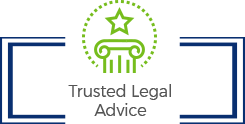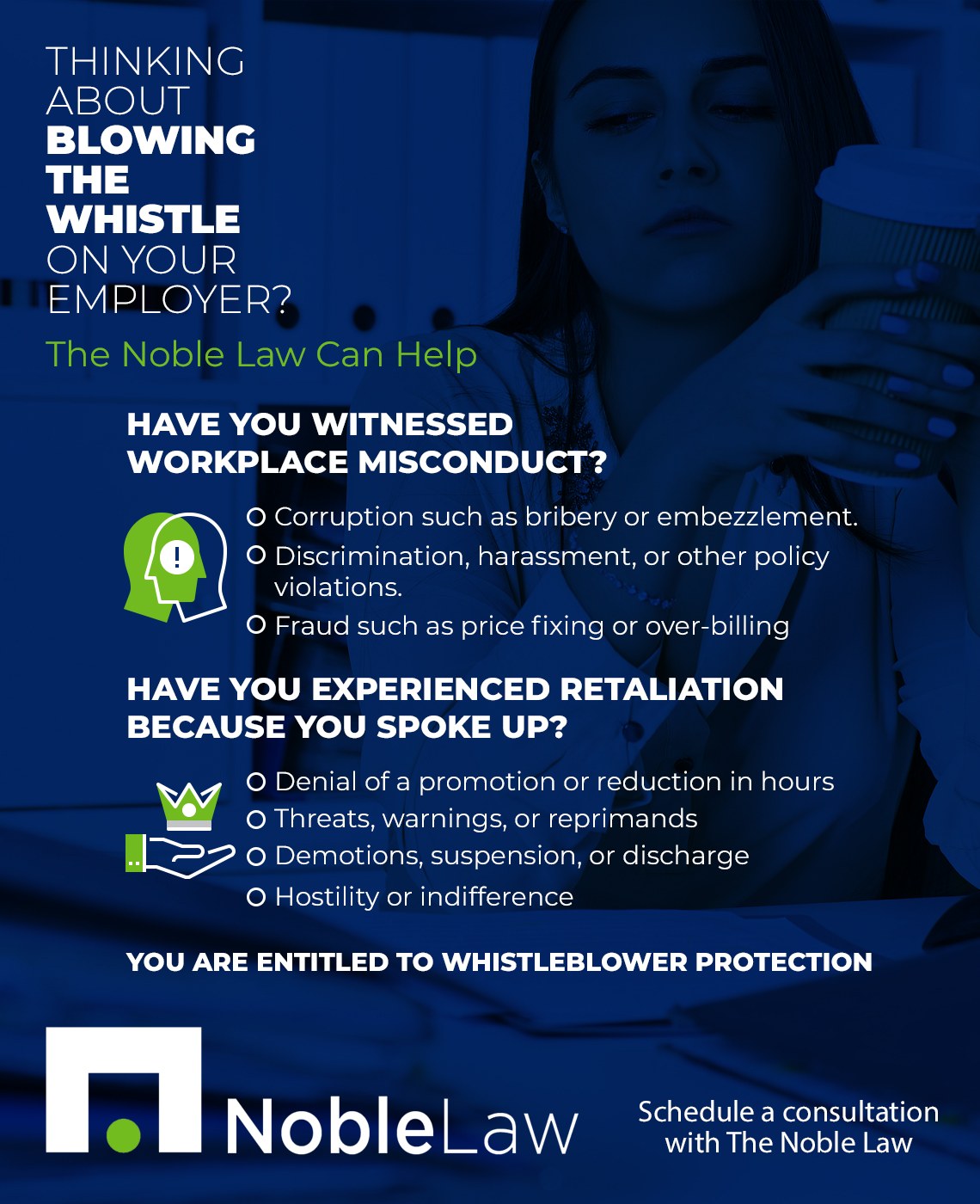Founded in 2009, The Noble Law provides consultations and legal advice to clients in South Carolina and across North Carolina on a variety of employment law issues, including workplace retaliation and whistleblower law. When you choose to partner with us, we will treat you as part of the team and provide you with top-notch, compassionate service. Open communication is key, and our employment law attorneys will support you every step of the way.
When it comes to workplace retaliation, whistleblower protection, or other issues regarding employment law, it can be hard to reach out to an employment attorney. Here at The Noble Law, we will work hard to understand your situation and help you identify your legal options, whether you choose to move forward with our firm or not. Schedule a consultation with a whistleblower lawyer in South Carolina or North Carolina today.



Engaging in a lawful, protected activity – such as reporting harassment – should never result in retaliation from your employer. If this happens, employers open themselves to potential liability for damages. In Charleston, if you have suffered adverse consequences for standing up against employer misconduct, you have legal rights that deserve protection.
At The Noble Law, we specialize in representing employees facing workplace retaliation. We do not just protect your rights – we fiercely advocate for them. If you are dealing with retaliation, it is time to take a stand.
Contact us today and let us be your dedicated allies in the fight against workplace injustice. A Charleston workplace retaliation attorney at The Noble Law is dedicated to holding employers accountable for their actions.
What Is Workplace Retaliation?
In a workplace, retaliation often occurs when an employee asserts their legal rights (as protected by federal or state law) or speaks out against employer misconduct, then is punished or subjected to negative treatment by their employer or supervisor.
Retaliation claims are protected under various federal anti-discrimination laws, including Title VII of the Civil Rights Act (Title VII), the Americans with Disabilities Act (ADA), and the Age Discrimination in Employment Act (ADEA), National Labor Relations Act (NLRA), among others. These laws prohibit employers from retaliating against employees for asserting their rights under these statutes.
Yet, retaliation cases continue to make up the majority of charges filed with the Equal Employment Opportunity Commission (EEOC)— accounting for a staggering 55.8 percent of all charges filed in 2020 —followed by discrimination due to disability, race, and sex (EEOC).


Types of Retaliation You Might Face
Here are some common manifestations of retaliation that individuals may experience:
- Terminations: If you have exercised your rights by reporting misconduct or participating in an investigation, getting fired could be a form of retaliation. Termination is one of the most frequent allegations in retaliation claims.
- Demotions: In Charleston, workplace retaliation can rear its head in the form of unwarranted demotions. Your career progression may be hindered as a direct response to your engagement in protected activities.
- Unfair Work Assignments: Retaliation may also manifest through unfair work assignments. Your employer might single you out for undesirable tasks or projects to punish you for asserting your rights. They might also take away more prestigious or desirable duties and responsibilities.
- Other Retaliatory Behaviors: Workplace retaliation in Charleston is not limited to the examples mentioned above. It can take on various forms, including hostile work environments, pay reductions, verbal abuse, bad performance reviews, or exclusion from career-advancing opportunities or important projects.
By recognizing potential signs of retaliation and seeking guidance from a workplace retaliation attorney, you take a proactive stance in reclaiming control and fostering a workplace environment that respects and values your contributions.
What You Should Do If You Suspect Retaliation
Suspecting workplace retaliation can be a distressing experience, but taking prompt and strategic actions is crucial to protect your rights. If you find yourself in this situation, you should:
- Document Everything: Start by creating a detailed record of the suspected retaliation. Record dates, times, locations, and the people involved. This documentation will be the foundation of your case.
- Speak with HR: Strengthen your position by submitting a written complaint to HR. This formalizes your grievances and serves as a documented record of your concerns.
- Preserve Evidence: Save any emails, texts, or voicemails related to the issue. Keep physical evidence and take photos or videos if needed.
- Consult with an Attorney: A workplace retaliation attorney can guide you on the legal aspects of your situation and advise on the best course of action.
What Makes a Strong Retaliation Case?
These three elements are fundamental to establishing a solid foundation for a retaliation claim:
- Engagement in Legally Protected Activity: The employee must prove that they were engaged in a legally protected activity.
- Retaliatory Action by the Employer: It must be proven the employer took an adverse or retaliatory action against the employee for this activity.
- Causal Link: The employee needs to show that the adverse action taken by the employer was a direct result of their engagement in the protected activity.
Obtaining hard evidence, such as reports, witness statements, emails, recordings, and other documented items, significantly strengthens an employee’s retaliation case. An attorney can help determine whether your conduct and that of your employer meets these criteria.



The Role of a Charleston Workplace Retaliation Attorney
We recognize that workplace retaliation cases are nuanced, and we take the time to listen to your account, ensuring we grasp the intricacies surrounding your situation. If your case proceeds, our attorneys are your dedicated advocates.
In preparation for your case, we actively assist in the collection and preservation of crucial evidence. This includes detailed documentation, emails, witness statements, and any other pertinent materials that will strengthen your position.
We are committed to representing the interests of our clients with determination and diligence. Our focus is on achieving the best possible outcome for you, whether through negotiations, administrative proceedings, or litigation.
Time is a critical factor in these cases—do not delay in seeking legal counsel. Reach out to us to initiate a conversation about your situation or if you have any questions or concerns
Is Your Employer Retaliating Against You? Contact The Noble Law
Your professional journey should not be marred by employer retaliation. At The Noble Law, we are here to be your shield against such threats. Connect with an employment law attorney by calling our office location in Charleston to schedule a free, confidential consultation.
Our team is standing by, ready to advocate and protect your rights.

Learn More
You deserve a safe, ethical, and legal workplace, and our employment law firm is here to help you protect your rights. If you have questions about whistleblower protections available to you in North Carolina or South Carolina, contact The Noble Law.
Here at The Noble Law, we listen. We hear you. We understand. Call today to discuss your rights and duties as a workplace whistleblower.
Along with representing clients with claims in the area of workplace retaliation and whistleblower protections, we also represent employees in a variety of other areas of employment law. These include Executive compensation disputes, Workplace discrimination, Pay, overtime, and leave, Workplace harassment, sexual harassment, and workplace assault, and Workplace investigations.
Learn more about our employment law firm’s Practice Areas and check out our About Page. When you choose to work with The Noble Law, you will gain a clear understanding of your legal options, whether you choose to move forward with our employment law firm or not. Our employment lawyers advise and represent clients in North Carolina and South Carolina, with offices in Charlotte, Chapel Hill, and Mt. Pleasant. If you’re interested in speaking with one of our employment attorneys, contact us today.


